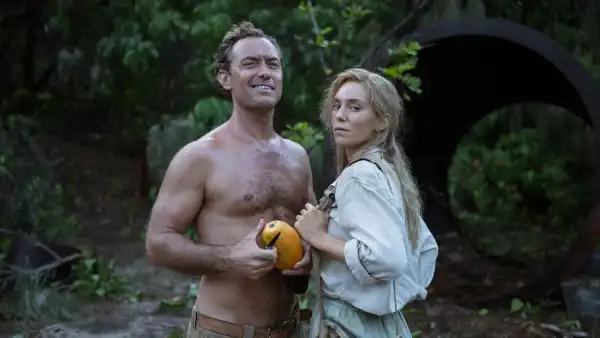
Save this storySave this storySave this storySave this story
The new film Eden is filled with outbursts of anger, unbridled passions, dark scenes of violence and a philosophy of nihilism – a clear departure from the usual style of Ron Howard, a director whose work usually radiates an almost naive optimism. But in a real sense, the film continues his interest in exotic locations and historical periods. Based on mysterious events that took place a century ago on a harsh island in the Galapagos archipelago, the film once again immerses the viewer in a world of real-life dangers – a worthy sequel to Howard's projects such as Apollo 13 (1995), In the Heart of the Sea (2015) and Thirteen Lives (2022). Should we include the critically panned Hillbilly Elegy (2020), which offered an alternative take on survival and a vaguely exoticized depiction of the hardships of J.D. Vance's childhood? “Eden,” despite its occasional vulgar humor, at least distances itself from such things. If I were guilty of advancing Vance's political career, I too would flee to the equator.
In the early 1930s, at least four colonists disappeared or died under controversial circumstances on the Galapagos island of Floreana. The 2014 documentary The Galapagos Affair: Satan Walked into Eden painstakingly reconstructed the events through the participants’ letters, allowing their conflicting versions to speak for themselves. Noah Pink’s (Tetris) screenplay takes us back to 1929, an era of Great Depression and rethinking of values. The first to arrive on Floreana are fanatical German idealists: Dr. Friedrich Ritter, a philosophical physician, and Dora Strauch, his patient and companion, fleeing the moral, spiritual (and financial) collapse of their civilization.
Friedrich and Dora are played by Jude Law and Vanessa Kirby, whose tanned, dirty faces do not hide their star-studded arrogance. And why not? The pioneers of Floreana are not only hermits, but also media figures. Friedrich’s letters, picked up by passing ships, are eagerly printed by European newspapers. Rumours about their life with a vegetable garden, a donkey, chickens and an inventive shower that saves water excite the public. But behind the facade of isolationism lies a mania for revolutionary grandeur: Friedrich is writing a treatise intended to change the history of mankind (in fact, a vulgarized Nietzsche), and the couple hopes that the island air will cure Dora, who suffers from multiple sclerosis.
Dora is not the only one seeking refuge on Floreana. In the winter of 1932, Heinz Wittmer (Daniel Brühl) arrives with his young wife Margrethe (Sidney Sweeney) and son Harry (Jonathan Tittel), who is recovering from tuberculosis. The practical and friendly Wittmers try to win the favor of their hosts, but encounter hidden aggression. Instead of hospitality, Friedrich sends them to remote caves, hoping that the heat, rain, insects and vicious dogs will drive away the newcomers. His calculations fail: Heinz and Margrethe turn out to be hardier than their “tourist” appearance suggested. The next guests are even more eccentric: an Austrian aristocrat (Ana de Armas) who calls herself Baroness Eloise Verborn de Wagner-Bosquet – a name that is difficult to pronounce, and her playful accent only adds to the confusion.
The Baroness makes fantastic plans for a luxury hotel, bringing in engineer Rudi Lorenz (Felix Kammerer) and bodyguard Robert Phillipson (Toby Wallace) for consultations. Much of the “meeting” is accompanied by loud moans that echo around the island. Not to be outdone, Friedrich displays strange sexual habits and exhibitionistic tendencies, greeting the Baroness with open rudeness. Fans will remember the young Lowe from The Talented Mr. Ripley (1999), sunbathing like an ancient god. Here, wandering around naked, he looks older and unkempt, but the poisonous arrogance has only become ingrained, as if burned away by the scorching sun.
Certain scenes in Eden feel like a caustic reworking of Aesop's fable. The Wittmers are industrious ants: they acquire a house, a garden, a pond, a cow, and a healthy child (Sweeney impresses in the birth scene with a wild, almost surreal intensity). The Baroness is a predatory dragonfly who orders the Wittmers' stores to be plundered when food is scarce. Friedrich and Dora are the poisonous centipede mentioned at the beginning: “Its sting is deadly,” Dora warns. “Everything here can kill.”
Who will be the victim and why? The suspense is maintained even when the plot descends into the atmosphere of Lord of the Flies. Eden is the story of a lost paradise (the reference to Genesis appears in Ritter's 1931 article “Adam and Eve in the Galapagos”). However, the balance between idyll and chaos is upset: the second half turns into a series of betrayals and bloody showdowns with guns, knives and even cattle as weapons. The viewer wants to know more about the beginning of colonization – the inventive construction of the Wittmers, the first harvests. These episodes flicker teasingly, while the rest is reduced to schematic descriptions. The characters work – the film should have followed their example.
Howard’s previous work shows his strength in other ways. Thirteen Lives, about the 2018 Thai rescue, is a masterfully constructed thriller in which technical details and characters reinforce each other. In Eden, the director seems a stranger to stories about greed and isolationism. Heroism and resilience are his element (as confirmed by the documentary Paradise Reborn, about the aftermath of the 2018 fire). Bruhl and Sweeney are more convincing as simple workers than the others (except for Kirby, with her grim restraint). Law and de Armas descend into the grotesque: Friedrich, furiously tapping on a typewriter, or the baroness with a monocle-like cigarette, like a tropical Cruella. They are too small for such an island – and for the film that tries to accommodate them. ♦
Sourse: newyorker.com






